TAQA Bundle
Who Really Owns TAQA?
The question of "Who owns TAQA company?" is more than just a matter of corporate curiosity; it's a gateway to understanding the company's strategic direction and future prospects. Unraveling TAQA's ownership structure reveals the forces shaping its role in the global energy sector, particularly as it navigates the complexities of the energy transition. This exploration is vital for anyone seeking to understand the dynamics of a major player like TAQA.
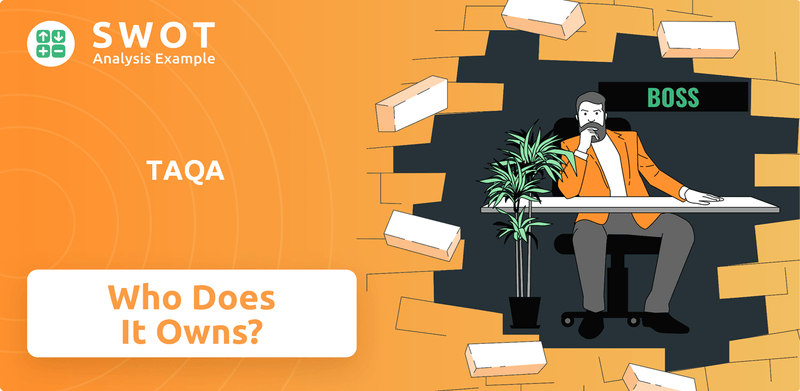
Understanding TAQA SWOT Analysis is crucial, but first, consider the significance of TAQA's ownership, a pivotal factor influencing its operational strategies and financial performance. From its inception as Abu Dhabi National Energy Company in 2005, TAQA's evolution has been marked by shifts in its shareholder base and strategic priorities. Knowing "Who owns TAQA" provides essential insights into its commitment to renewable energy and its position in the competitive landscape. Discover the details of TAQA shareholders and TAQA investors.
Who Founded TAQA?
The Abu Dhabi National Energy Company, also known as TAQA, was established in 2005. The company's inception was driven by the Abu Dhabi government's strategic vision to consolidate and expand its energy and water assets into a publicly listed entity. This initiative aimed to create a robust, diversified energy and utilities company capable of operating on an international scale.
The founding ownership structure of the TAQA company was predominantly sovereign. The Abu Dhabi government, through the Abu Dhabi Water and Electricity Authority (ADWEA), was the initial sole owner. ADWEA was later restructured into the Emirates Water and Electricity Company (EWEC) and other entities, which continued to hold significant stakes.
Given its governmental origin, TAQA did not have individual founders in the traditional sense. Instead, the company was formed through the transfer of assets from existing government-owned utilities and energy ventures. This approach facilitated a centralized control and strategic direction from the outset.
The initial capitalization and assets of TAQA were transferred from government-owned entities. There were no initial ownership disputes or buyouts, as the company was launched under a unified governmental mandate. The focus was on establishing a strong foundation for the company's future growth and international expansion.
- TAQA's initial ownership was entirely within the Abu Dhabi government.
- The company's formation involved the consolidation of existing energy and water assets.
- The strategic goal was to create a globally competitive energy and utilities provider.
- Early agreements centered on regulatory frameworks and asset allocation.
TAQA SWOT Analysis
- Complete SWOT Breakdown
- Fully Customizable
- Editable in Excel & Word
- Professional Formatting
- Investor-Ready Format
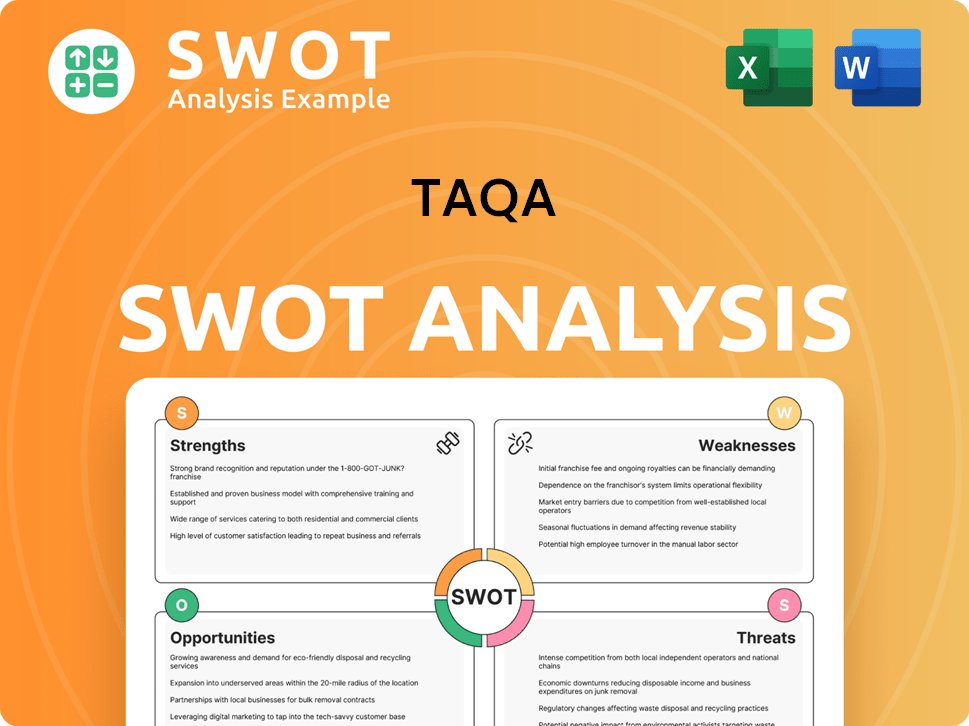
How Has TAQA’s Ownership Changed Over Time?
The evolution of the TAQA company's ownership structure has been significantly influenced by its status as a publicly listed entity. TAQA, listed on the Abu Dhabi Securities Exchange (ADX) in 2005, experienced a pivotal shift in 2020. This was due to a strategic transaction involving Abu Dhabi National Energy Company (ADPower), a subsidiary of ADQ (formerly Abu Dhabi Power Corporation). This transaction saw the transfer of ADPower's power and water assets to TAQA, reinforcing its position as a major player in utilities, particularly in the EMEA region. This strategic move substantially impacted TAQA's market capitalization and asset base.
This strategic alignment has positioned TAQA to play a key role in the UAE's energy transition goals. The company's operations and investments are increasingly focused on sustainable energy solutions. The Brief History of TAQA provides a more detailed overview of its growth and strategic shifts.
| Event | Date | Impact |
|---|---|---|
| Initial Public Offering (IPO) | 2005 | TAQA listed on the Abu Dhabi Securities Exchange (ADX), opening up ownership to public investors. |
| ADPower Transaction | 2020 | ADPower's assets transferred to TAQA, significantly increasing its asset base and market capitalization. |
| Ongoing | 2024-2025 | Continued focus on renewable energy investments and alignment with UAE's Net Zero by 2050 initiative. |
As of early 2024, the primary shareholder of TAQA is the Emirate of Abu Dhabi, primarily through ADQ, which holds a controlling stake. This government-backed ownership provides financial stability and strategic alignment with national development goals. Other TAQA shareholders include institutional investors, mutual funds, and index funds. The strong governmental ownership influences company strategy, particularly in long-term infrastructure development and renewable energy investments. This structure ensures strategic decisions align with national economic and energy policies.
TAQA's ownership structure is primarily influenced by the government of Abu Dhabi through ADQ.
- ADQ holds a substantial majority stake in TAQA.
- The company is listed on the Abu Dhabi Securities Exchange (ADX).
- TAQA's strategy aligns with the UAE's Net Zero by 2050 initiative.
- Institutional investors and mutual funds also hold shares.
TAQA PESTLE Analysis
- Covers All 6 PESTLE Categories
- No Research Needed – Save Hours of Work
- Built by Experts, Trusted by Consultants
- Instant Download, Ready to Use
- 100% Editable, Fully Customizable
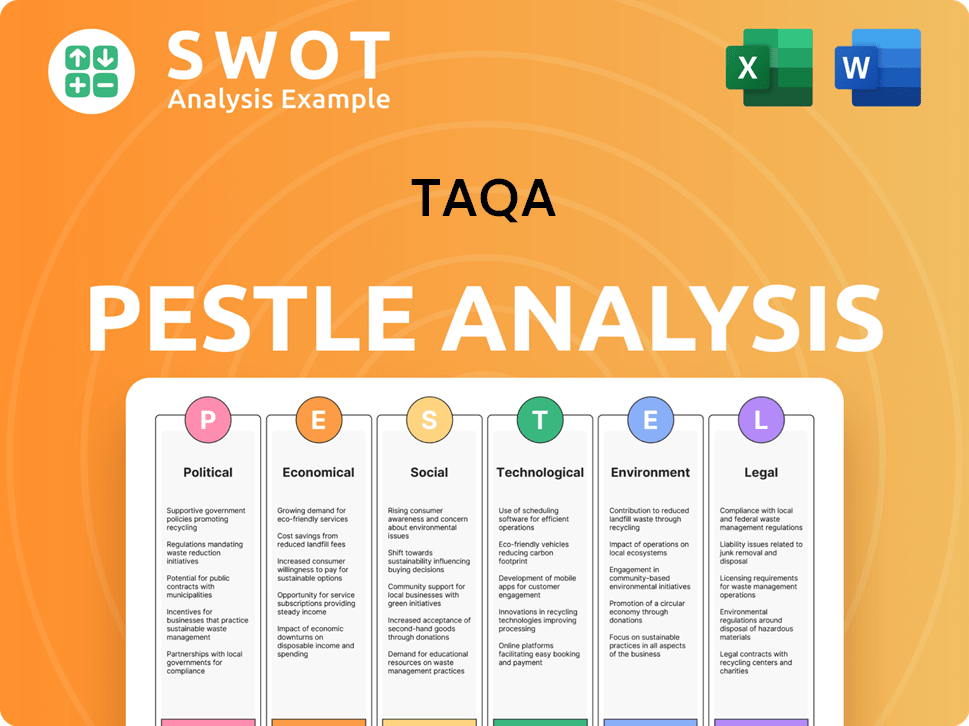
Who Sits on TAQA’s Board?
As of early 2024, the Board of Directors of the TAQA company includes representatives from its major shareholder, ADQ, along with independent professionals. This structure aims to provide strategic oversight and ensure good corporate governance. The Chairman of the Board often holds a significant position within Abu Dhabi's governmental or investment entities, reflecting the close ties between the company and its primary owner. Other board members bring expertise in energy, utilities, finance, and international business, some serving as independent directors.
The composition of the board is designed to balance the interests of the majority shareholder with the need for independent oversight. The board's role is crucial in guiding the company's strategic direction, especially concerning significant investments in infrastructure and renewable energy projects. The presence of independent directors helps ensure that decisions are made in the best interests of all stakeholders, while the representation from ADQ ensures alignment with the shareholder's objectives. The board's structure supports the company's commitment to enhancing transparency and adhering to international best practices for publicly listed entities.
| Board Member | Role | Affiliation |
|---|---|---|
| Jasim Husain Thabet | Group Chief Executive Officer and Managing Director | TAQA |
| Mohamed Hassan Alsuwaidi | Chairman | ADQ |
| Other Board Members | Various | Independent and ADQ Representatives |
The voting structure at TAQA generally follows a one-share-one-vote principle for its publicly traded shares. However, because ADQ holds a substantial majority stake, it effectively controls the voting power. There are no publicly disclosed special voting rights that would give disproportionate control to entities or individuals beyond the majority shareholder. While public TAQA shareholders have voting rights, their collective influence is less than that of ADQ. Recent governance efforts have focused on enhancing transparency and aligning with international best practices, even with a strong state-backed majority. Due to the stable, concentrated TAQA ownership structure, there have been no significant public proxy battles or activist investor campaigns.
TAQA's board includes representatives from its major shareholder, ADQ, and independent professionals.
- ADQ's significant stake gives it considerable voting power.
- The board is designed to balance the interests of the majority shareholder with independent oversight.
- Governance focuses on transparency and international best practices.
- Decision-making is heavily influenced by the strategic objectives of ADQ.
TAQA Business Model Canvas
- Complete 9-Block Business Model Canvas
- Effortlessly Communicate Your Business Strategy
- Investor-Ready BMC Format
- 100% Editable and Customizable
- Clear and Structured Layout
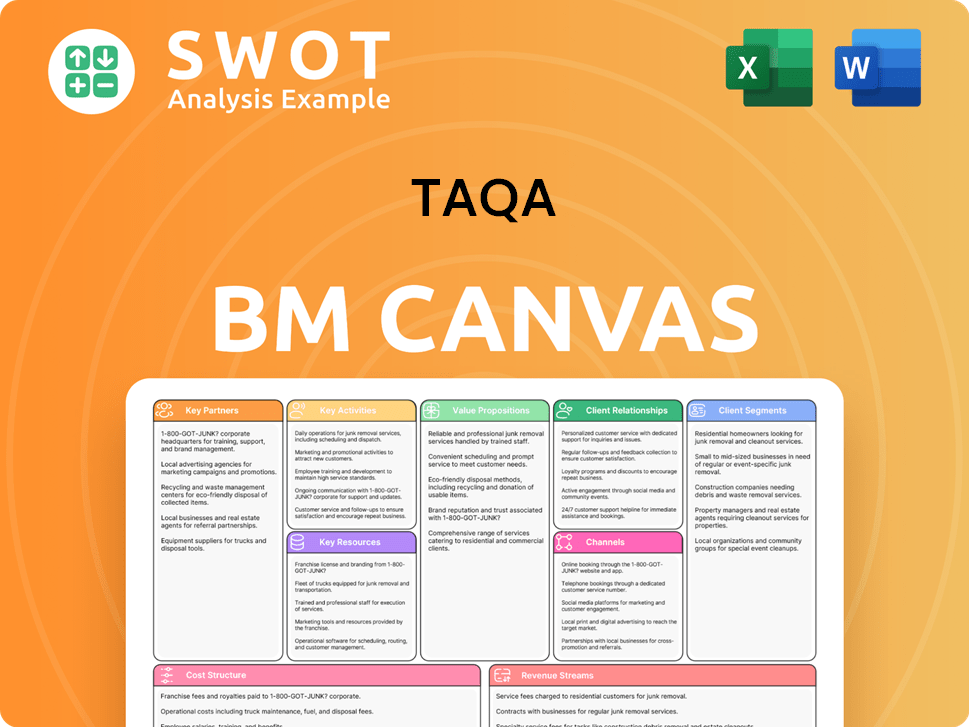
What Recent Changes Have Shaped TAQA’s Ownership Landscape?
Over the past few years (2022-2025), the TAQA company has seen significant strategic developments, particularly with the 2020 transaction that consolidated Abu Dhabi's power and water assets under its umbrella. This move solidified its position within the UAE's energy sector. In 2023, TAQA reported a net income of AED 16.7 billion (approximately USD 4.55 billion), reflecting strong operational performance and strategic acquisitions. The company also announced a Q4 2023 net income of AED 2.0 billion (approximately USD 0.54 billion).
Recent trends in TAQA ownership continue to show strong, stable majority ownership by ADQ. While major shifts in the controlling stake haven't occurred, the company has been active in capital markets. In 2024, TAQA issued a dual-tranche bond, including a USD 750 million 5-year 4.750% tranche and a USD 750 million 10-year 5.000% tranche, demonstrating investor confidence. Industry trends such as ESG factors and the push towards renewable energy are influencing TAQA's investment strategy, rather than changing its ownership structure significantly.
| Metric | Year | Value |
|---|---|---|
| Net Income | 2023 | AED 16.7 billion (approx. USD 4.55 billion) |
| Q4 Net Income | 2023 | AED 2.0 billion (approx. USD 0.54 billion) |
| Bond Issuance (5-year) | 2024 | USD 750 million, 4.750% |
| Bond Issuance (10-year) | 2024 | USD 750 million, 5.000% |
The company's commitment to growth and the energy transition suggests continued strategic investments. For more insights, explore the Revenue Streams & Business Model of TAQA, which offers a detailed look at how TAQA operates.
ADQ maintains a strong majority ownership. The company has successfully issued bonds, showing investor confidence. Strategic investments are focused on growth and energy transition.
Significant net income of AED 16.7 billion in 2023. Q4 2023 net income was AED 2.0 billion. Strong operational performance drives financial results.
Focus on ESG factors and renewable energy. The company is committed to growth and further asset optimization. No significant changes in core ownership profile are expected.
Successful dual-tranche bond issuance in 2024. Attracts diverse investors. Effectively manages its capital structure.
TAQA Porter's Five Forces Analysis
- Covers All 5 Competitive Forces in Detail
- Structured for Consultants, Students, and Founders
- 100% Editable in Microsoft Word & Excel
- Instant Digital Download – Use Immediately
- Compatible with Mac & PC – Fully Unlocked
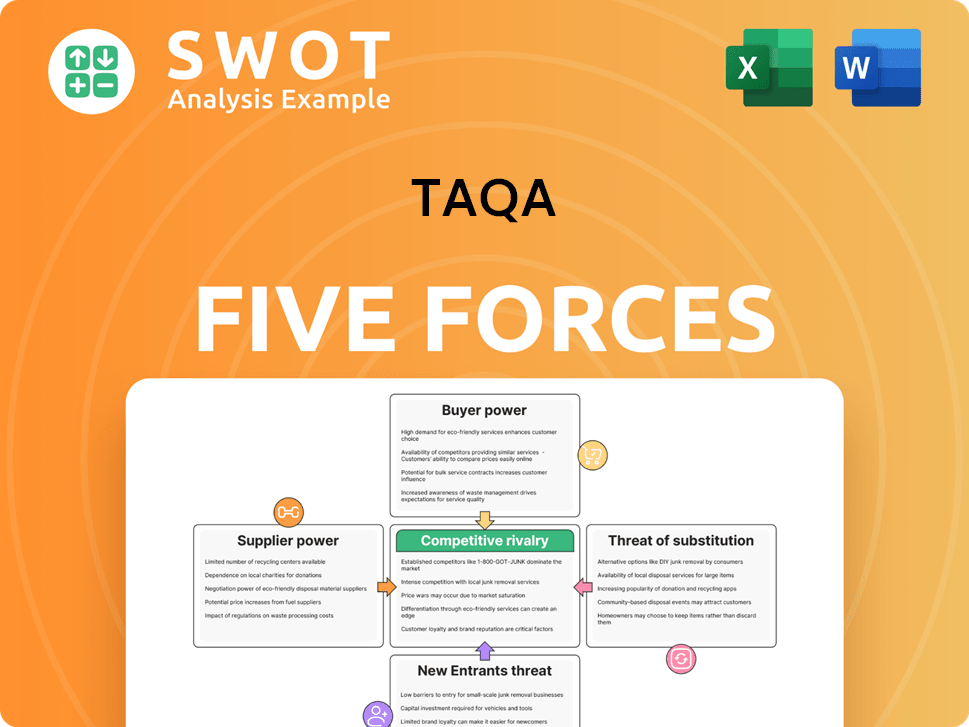
Related Blogs
- What are Mission Vision & Core Values of TAQA Company?
- What is Competitive Landscape of TAQA Company?
- What is Growth Strategy and Future Prospects of TAQA Company?
- How Does TAQA Company Work?
- What is Sales and Marketing Strategy of TAQA Company?
- What is Brief History of TAQA Company?
- What is Customer Demographics and Target Market of TAQA Company?
Disclaimer
All information, articles, and product details provided on this website are for general informational and educational purposes only. We do not claim any ownership over, nor do we intend to infringe upon, any trademarks, copyrights, logos, brand names, or other intellectual property mentioned or depicted on this site. Such intellectual property remains the property of its respective owners, and any references here are made solely for identification or informational purposes, without implying any affiliation, endorsement, or partnership.
We make no representations or warranties, express or implied, regarding the accuracy, completeness, or suitability of any content or products presented. Nothing on this website should be construed as legal, tax, investment, financial, medical, or other professional advice. In addition, no part of this site—including articles or product references—constitutes a solicitation, recommendation, endorsement, advertisement, or offer to buy or sell any securities, franchises, or other financial instruments, particularly in jurisdictions where such activity would be unlawful.
All content is of a general nature and may not address the specific circumstances of any individual or entity. It is not a substitute for professional advice or services. Any actions you take based on the information provided here are strictly at your own risk. You accept full responsibility for any decisions or outcomes arising from your use of this website and agree to release us from any liability in connection with your use of, or reliance upon, the content or products found herein.